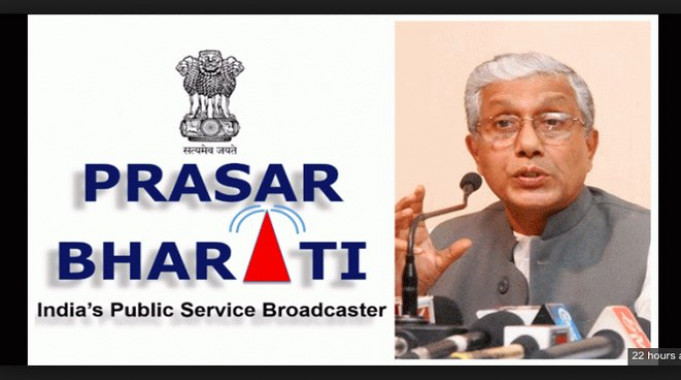A short, anecdotal history of DD-AIR censorship
Doordarshan’s decision to hold back Tripura CM Manik Sarkar’s speech, recorded by DD a few days earlier for telecast on August 15, reminds one of an anecdote involving DD and an earlier CPM chief minister Jyoti Basu. After Rajiv Gandhi became prime minister in 1985 he decided Doordarshan was fuddy duddy and timid, and needed professionalizing. It also needed to become more credible. He then handpicked Bhaskar Ghose –a West Bengal cadre IAS officer—in 1986 as Director General to head it as part of an exercise which became known as ‘Operation Credibility.’
Ghose was fond of recounting a single statement which Doordarshan carried in a current affairs programme made by a private producer, which represented the zenith of independence on Doordarshan in those days. On it Jyoti Basu had said dryly at one point, “Why should I tell lies, I am not a Congressman.” DD left that sentence in, and felt terribly brave about it. It was an era termed as DD’s glastnost. but even as the broadcaster began to spread its wings the experiment ended abruptly two years later with the DG losing his job. Elections were drawing near and the ruling party lost its stomach for a public broadcaster that took its own decisions.
All India Radio and Doordarshan’s saga of what to carry or not carry, spans decades. Doordarshan was created after the Emergency was declared in 1975, as a separate entity for television from AIR. Its personnel learned lessons on censorship and propaganda very quickly . Sanjay Gandhi and his five point programme had to be promoted, Jai Prakash Narain was to be blacked out, the only films to be shown on Doordarshan were those of film stars who had supported the Emergency. When a huge opposition rally was held just before the 1977 elections addressed by opposition leaders, Doordarshan telecast the film “Bobby”, hoping people would stay at home and watch it. But huge crowds attended the rally anyway.
News on DD has always been a problematic proposition. In practice, news involving top leaders, and the Government of India and state governments has to be confirmed by the government before the official media can broadcast it. You don’t tell people that the Prime Minister has been assassinated because it might undermine the State.
When Jawaharlal Nehru suffered a 6 am heart attack and lost consciousness on May 27th AIR kept mum till his death was officially announced at 2.25 pm. When his daughter Indira was assassinated around 9.30 am in 1984, the news was not aired by AIR till 5.57 pm. As everybody now knows, Rajiv Gandhi learned of his mother’s death on the BBC.
When Rajiv Gandhi was assassinated in 1991, DD did not interrupt a programme on birds to announce his death because by then, he was not the Prime Minister, he was a mere opposition leader! I remember asking an information service officer at that time, and being told as much. You did not have scrolls in those days to run below the programming!
You don’t show that the Babri Masjid has fallen because it could spark riots.
But sometimes the holding back became ludicrous. As in December 1985 when there was a gas leak in Delhi and people were fleeing their homes, but AIR did not put out the news of the leak till two and a half hours later because it was waiting to confirm the leak.
For DD and AIR it does not matter which government is in power, and it does not matter if you also end up holding up telecast of a debate in parliament, because you do not want the government to look bad.
In May 2002, when Atal Bihari Vajpayee, the then prime minister was replying to a censure motion in parliament, and lambasting the media for its role in Gujarat, the debate was not carried live by DD. Parliament did not have its own channels then. It was shown instead on the terrestrial TV network’s low power transmitter which covers a range of 10 km around Parliament House. There was no recorded telecast later either, though Star News showed the highlights of the debate after it was over. Two explanations were offered by Doordarshan, one, that it could not afford to lose revenue by carrying the debate at prime time, and two, that it had not received a request from parliament to telecast the debate live.
By August 2004, after a journalist was bluntly critical of the BJP leader Vijay Kumar Malhotra on the programme, the NDA government decided that a 7.30 am discussion on the day’s news which went live on AIR's FM channel daily, should stop being live and be recorded before hand.
In early May 2014,just before the elections, there was the famous instance of DD being accused of censoring candidate narendra modi’s interview on Doordarshan in which he said that Priyanka Gandhi was like his daughter. DD had said at that time that there were no cuts, but that the interview given while walking on a lawn, and required a lot of post-production!
And now we have Manik Sarkar. Pretty much his entire speech was an attack on the Central Government, with a reference to the BJP’s allegedly inglorious record during the struggle for independence. A much greater provocation then, than what Bhaskar Ghose had to deal with way back in 1986, from Jyoti Basu!
References
Broadcasting in India, PC Chatterji, Sage, 1987
Through the Magic Window, Sevanti Ninan, Penguin, 1995
http://www.thehindu.com/thehindu/mag/2002/08/25/stories/2002082500170300.htm







